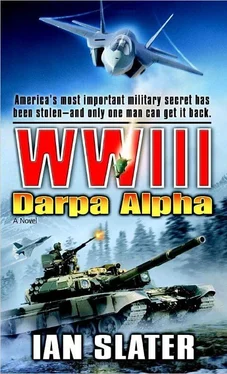Then screaming and chaos as a firefight erupted. Melissa, punched backward, saw three figures, heard, “Ga ja! Ga ja! ” again, Kegg lobbing a grenade and dropping down next to her, a mad rushing like a bull charging amid the crash and flame of the grenade, and more feral screaming.
The Hummer broke cover from the shoulder-high reeds twenty yards back, the corporal driving hard into the reeds, the other marine manning the front-right-door machine gun, its red tracer cutting through the snow-bent stalks in a segmented red line ending where he’d seen the trouble, the corporal careful to steer east of the GPS vector that marked the edge of the mined moat of frozen marsh around the H-block, the latter still unseen but supposedly there, SATPIX verified.
Three terrorists were down, all dead from what Kegg could make out, but his marine training had instilled in him the caution needed when approaching a downed enemy. Terrorists, more than any other combatants marines had encountered, except perhaps for the South Seas detachment of the Japanese Army in 1941–45, were known to booby-trap their dead and themselves, lying on a grenade, pin pulled, the weight of their body holding down the spring lever. You rolled them over at your peril. Melissa found it excruciating to breathe; the impact from the terrorist’s AK-47 burst, or rather from the one shot that had hit her in the chest, although having been stopped by her flak jacket, had caused an enormous and painful welt on her left breast, the shock of the hit having penetrated deep into her chest, and, she suspected, broken a rib. But there was no way she was going to complain and become the whining bitch. If she did so, it’d be in e-mails home from Yorktown —if they got out of this mess. She could imagine the leads: “Congressman Calls for End to Female Combatants” “‘A Woman’s Place Is in the Home, Not on the Battlefield,’ Say Southern Baptist Bishops.”
“You okay?” asked Kegg, who, while he kept his eyes on the three bodies, stood up slowly, his M4’s clip-on launcher having another grenade up the spout just in case.
“Yeah,” she told him.
Kegg moved off to the right to avoid being in her line of fire. “Cover me,” he told her.
The terrorists looked dead, from head shots and grenade shrapnel, but he knew he had to be sure, feel the wrist pulse. Melissa, the fifteen pounds of her M40A1 sniper rifle feeling like a ton, covered him, the pain in her rib cage feeling like someone twisting an ice-cold knife inside, every intake of air an act of will.
There was no pulse in any of them. He wasn’t going to turn them over. Even so, he and Melissa could see they were two Caucasian terrorists and an Asian — Chinese or Korean. They reported this to the Hummer corporal whose vehicle’s roof-mounted TOW radar was sweeping the snowy expanse for the tank that had disappeared, the corporal as well as Kegg and Melissa hypothesizing that the earlier squeaking noises they’d heard had been armor retreating from a defilade position beyond the wood.
“Should search them for intel,” Melissa Thomas said, trying not to grimace with her pain, but Kegg noticed anyway and, seeing her flak jacket perforated, asked, “You bleeding?”
“No. Just a bit of indigestion. That slug winded me.”
“Damn lucky it wasn’t higher,” the Hummer corporal said. “You’d have a tracheotomy you didn’t ask for.”
She grinned manfully, asking him again, “Should we check them for intel?” She knew it was paramount in this kind of operation, especially given the minefield. SATPIX had indicated temperature differential spots where earth had been disturbed, dug up, but snow covering the ground made it difficult to pinpoint the mines while you were being shot at.
The corporal had a lariat, formed with the rope from the Hummer’s front bumper. He tossed the loop over the dead Asian. “I’ll haul him over in case he’s lying on a ‘pine cone.’”
“I like that better,” said Kegg, who wanted no part of frisking anyone lying facedown.
“Let’s get out of here,” said the other marine, manning the front-door gun. “I’ve got dots on the radar. Big ones.”
“Second wave?” asked Kegg.
“Due north,” said the Hummer’s front-door gunner, doubling as radar nerd.
“So?” pressed Kegg. “What’s the problem?”
“Problem, marine,” cut in the marine corporal, “is that our second wave would be coming from the southeast, maybe due east, not out of the north.”
“Oh,” said a disappointed Kegg as the Hummer reversed, taking up the rope’s slack at the front, the door gunner enjoining his fellow marines quietly but urgently to get aboard as he watched the radar dots grow. “Let’s get going. If they’re voodoos, we’re too exposed.”
Melissa Thomas smiled for the first time since her chat on the Stallion with Freeman. “Exposed.” Maybe, she thought, in the sense they were out on the frozen expanse of marsh, but the snow was falling so heavily, visibility was now only twenty feet at best. That was as much a defense as a hindrance.
The snow-dotted body rolled over. The Hummer advanced and reversed twice more. There was no sign of a booby trap on either of the other two bodies; the three terrorists probably hadn’t time to do anything more than get off a few rounds in the direction of Melissa and Kegg before Kegg felled them.
As the marine corporal quickly recoiled the rope, Melissa, with a great effort and the stink of the Hummer’s diesel exhaust temporarily shutting down her nose, knelt down and started frisking the Asian while Kegg and the corporal who’d finished with the rope began searching the two Caucasian terrorists.
“Bingo!” said Melissa.
The corporal and Kegg turned toward her, the Hummer’s gunner repeatedly making a 360-degree sweep, urging them to hurry up. “Let’s go! I don’t like it.”
“What’ve we got, Thomas?” the corporal asked, watching her unrolling a scroll she’d found inside the Asian’s jacket.
“Some kind of map,” Melissa answered.
“C’mon, guys!” said the gunner.
Melissa flattened it out quickly. The map was the size of a man’s handkerchief. She and Kegg glanced at it, then she rapidly rolled it up, tucking it inside her helmet against the liner. “We’ll give it to Freeman. That SpecWar guy of his — the lieutenant—”
“Lee,” said the gunner. “Yeah, Lieutenant Lee. Hey, that tank’s gotta be ’round here somewhere.”
“Relax,” the corporal told him. “You see it on the radar?”
“No,” said the gunner, “but those fuckin’ bogeys are moving in.”
“Maybe they’re UFOs!” joshed the corporal.
“You a fucking comedian?”
“How many bogeys you got, Pete?”
“Looks like nine,” the gunner answered. “Three threes.”
“What was that?” the corporal asked Melissa as they walked to the Hummer. “The printing on that guy’s map? Arabic?”
“Korean, I think,” said Melissa. “Anyway, that Lee guy’s multilingual. He should know.” She looked back at Kegg. “Might know what ‘Ga ja!’ means too.”
“Maybe it’s his grocery list,” joked Kegg.
“For cryin’ out loud,” said the machine gunner, looking anxiously over the reeds and stealing a glance at the radar. “What the fuck’s going on with you guys? Let’s go !”
A nervous rifleman on the wood’s perimeter squeezed off a three-round burst before Freeman and Aussie saw the Hummer’s whip aerial and its TOW missile housing through the falling snow. The Hummer was hit “midships,” as described by the enraged corporal who had been driving, and who was now tearing the proverbial strip off a young marine whose first live fire in combat was to hit the Hummer. Freeman kept out of it. The marine’s humiliation was punishment enough. Besides, the general, more conscious than anyone in the wood of time slipping by and the twenty-four-hour deadline bearing down on him, turned his attention to the scroll found by Melissa Thomas on the dead Asian terrorist. As the general unrolled the scroll, saw the dotted lines and elaborately styled calligraphy, he realized that the map was more or less a duplicate of Ilya’s more roughly drawn sketch. But whereas Ilya had said the entrance to and the exit from the tunnels were the same, the dead Korean’s map, his nationality confirmed by Johnny Lee’s examination of the black-inked characters, showed an exit tunnel.
Читать дальше












